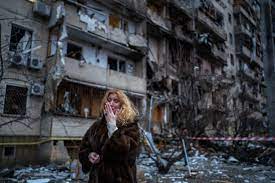Alongside the agony of war in Ukraine (shown here), there’s another process: documenting war crimes.
The result, said Tom Jennings – director of a “Frontline” report at 10 p.m. Tuesday (Oct. 25) on PBS – will be a tribunal that “will essentially be a new Nuremberg: Nuremberg 2.0.”
That, however, would be a long time from now. Raney Aronson-Rath, the “Frontline” producer, points to the successful conviction of Ratko Mladic, a Bosnian general. That “took over five years – just the trial …. Collecting of evidence before that was multiple years.”
That’s what people are doing now – gathering details that might be used in the distant future. “There’s been such a flood of posts and video and photos on social media from Ukraine,” Beatrice Dupuy said.
She’s a “news verification journalist” for the Associated Press, which is linking with “Frontline” for the report. Her job is to nail down the specifics on possible war crimes; talking with the Television Critics Association three months ago, she already had 370 in a database.
That’s just the start, Jennings said. “Here in Ukraine, there are tens of thousands of stories about war crimes …. You stop anybody on the street and you will hear just a jaw-dropping story.”
At a morgue, he said, reporters met a woman named Tanya who was “looking for the body of her husband. It’s led us on an investigation to find out what happened to (him), and it’s also led us to a multiplicity of other killings.”
That’s just one of the stories in “Putin’s Attack on Ukraine: Documenting War Crimes.”
There are more, in a slow process. When Mladic was indicted in 1996, he had disappeared. He was arrested in 2011, with a trial beginning the next year. In 2017, he was convicted and sentenced (at 75) to life in prison, where he remains.
